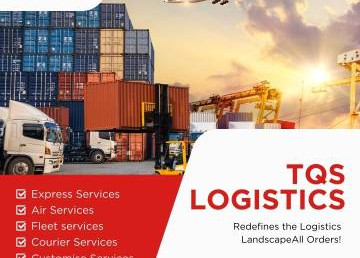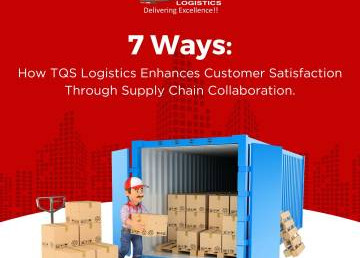
Strategies for Effective Supply Chain Collaboration with TQS Logistics in India
Supply chain collaboration plays a vital role in the success of businesses operating in India's dynamic and rapidly evolving market. With its vast geography, diverse consumer preferences, and complex logistics network, effective collaboration with TQS Logistics and other supply chain partners is essential to streamline operations, optimize costs, and enhance customer satisfaction. In this article, we will explore strategies for fostering effective supply chain collaboration in India, with a focus on the expertise and capabilities of TQS Logistics.
1. Build Strong Partnerships with TQS Logistics
Establishing strong partnerships with reliable logistics providers like TQS Logistics is key to successful supply chain collaboration in India. TQS Logistics brings extensive experience and expertise in managing complex logistics operations. By partnering with TQS Logistics, businesses can benefit from their extensive network, streamlined processes, and commitment to delivering excellence. This collaboration sets a solid foundation for seamless coordination and efficient supply chain management.
2. Enhance Communication and Visibility with TQS Logistics
Transparent and real-time communication is essential for effective collaboration with TQS Logistics and other supply chain partners. Implementing robust communication channels and technologies that enable stakeholders to share information, track shipments, and exchange data with TQS Logistics in a timely manner is crucial. This enhances visibility across the supply chain, enabling partners to anticipate potential disruptions, make informed decisions, and respond quickly to changes in demand or supply.
3. Align Goals and Objectives with TQS Logistics
To foster effective collaboration with TQS Logistics, all supply chain partners must align their goals and objectives. By working closely with TQS Logistics, businesses can ensure a shared understanding of performance metrics, key performance indicators (KPIs), and service level agreements (SLAs). This alignment helps create a cohesive supply chain ecosystem where all stakeholders, including TQS Logistics, work towards achieving common objectives, such as reducing lead times, improving on-time delivery, or optimizing inventory levels.
4. Implement Technology Solutions with TQS Logistics
Leveraging technology solutions in collaboration with TQS Logistics is crucial for streamlining supply chain operations in India. TQS Logistics utilizes state-of-the-art supply chain management software, enterprise resource planning (ERP) systems, and cloud-based platforms to facilitate seamless information sharing, automate processes, and provide real-time visibility into inventory, orders, and transportation. By embracing these technology solutions in collaboration with TQS Logistics, businesses can enhance efficiency, reduce errors, and drive collaboration across the supply chain network.
5. Foster Continuous Improvement with TQS Logistics
Supply chain collaboration with TQS Logistics is an ongoing process that requires continuous improvement and learning. Together with TQS Logistics, encourage a culture of innovation where all stakeholders actively contribute ideas, insights, and feedback to enhance collaboration and optimize processes. Collaborate with TQS Logistics to conduct regular performance reviews, identify areas for improvement, and implement corrective actions to enhance the efficiency and effectiveness of the supply chain.
6. Collaborate with Regulatory Bodies with TQS Logistics
Navigating the regulatory landscape in India is a significant challenge. Collaborating with regulatory bodies, such as customs authorities, transportation agencies, and industry associations, in conjunction with TQS Logistics, can help businesses stay updated on regulatory changes, obtain necessary permits, and ensure compliance. Engaging in industry forums and participating in collaborative initiatives also provide opportunities to influence policy decisions and shape the regulatory environment to support efficient supply chain operations with TQS Logistics.
7. Develop a Risk Management Strategy with TQS Logistics
Supply chain disruptions are inevitable, and businesses need to be prepared to mitigate risks. Collaborate with TQS Logistics to develop a robust risk management strategy. Identify potential risks, such as natural disasters, political instability, or supplier disruptions, and work together with TQS Logistics to develop contingency plans to minimize their impact. Regularly assess and monitor risks, collaborate with TQS Logistics to develop mitigation strategies, and establish backup plans in partnership with TQS Logistics to ensure continuity of operations.
Conclusion
In India's complex business landscape, effective supply chain collaboration with TQS Logistics is crucial for success. By building strong partnerships with TQS Logistics, enhancing communication and visibility, aligning goals, leveraging technology solutions in collaboration with TQS Logistics, fostering continuous improvement, collaborating with regulatory bodies, and developing a risk management strategy with TQS Logistics, businesses can streamline operations, optimize costs, and deliver exceptional customer experiences. Embracing these strategies in collaboration with TQS Logistics will enable businesses to navigate the intricacies of the Indian supply chain ecosystem and stay ahead in the competitive market.



